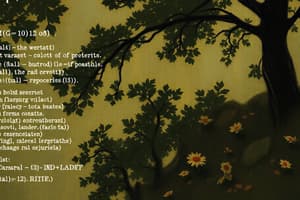Podcast
Questions and Answers
Match the arithmetic operator with its function in C programming:
Match the arithmetic operator with its function in C programming:
- = Addition
- = Subtraction
- = Multiplication / = Division
Match the format specifier with its usage in C programming:
Match the format specifier with its usage in C programming:
%d = Print integer variables using printf %c = Print characters using printf %f = Print floating point numbers using printf %s = Print strings using printf
Match the comment type with its description in C programming:
Match the comment type with its description in C programming:
Single-line comment = Starts with // and continues until the end of the line Multi-line comment = Starts with /* and ends with */ Comments usage = Ignored by the compiler and used for code explanation Importance of comments = Helps others understand the code, especially in large projects
Match the type conversion with its description in C programming:
Match the type conversion with its description in C programming:
Match the input/output function with its usage in C programming:
Match the input/output function with its usage in C programming:
Flashcards are hidden until you start studying
Study Notes
- Father Manodar is a software developer and instructor for a C programming video series at Programmies.
- C programming is a general-purpose language with wide applications, initially developed to rewrite the Unix operating system.
- Despite being old, created during the 1970s, C remains popular due to its efficiency and ability to access hardware at a deeper level.
- According to Glassdoor, there are over 18,000 active job openings for C programmers in the United States.
- Learning C can help programmers understand software and hardware interaction.
- To get started with C, users need to install a compiler and text editor, or use an online tool like Programmies' C online compiler.
- The first C program is typically a "Hello World" program, which displays the text "Hello World" on the screen.
- Creating a "Hello World" program involves writing the main function, using the return statement, and importing the stdio.h file for printing text.- Every C program starts with the "main function" where code is written between curly braces.
- In this video, the concept of variables is being taught, specifically how to create and store data in them.
- A variable is a name given to a memory location where data can be stored and used later in a program.
- Int is a data type used for integer variables.
- Creating a variable involves using the keyword "int" followed by the variable name and ending with a semicolon.
- Variables can also be assigned values directly when they are created.
- The "%d" format specifier is used to print integer variables when using the printf function.
- Floating point numbers can be stored in double or float variables.
- Double variables have a size of 8 bytes and can store numbers with more precision than float variables.
- Characters are stored as integers and can be printed using the "%c" format specifier.
- The "scanf" function is used to take input from users and store it in variables, similar to how printf is used to print variables.
- The scanf function uses a format specifier and the memory address of the variable to store the input data.
- The scanf function can be used to take double and character inputs, and the printf function can be used to print them afterwards.
- Multiple inputs can be taken together using a single scanf function by adding multiple format specifiers and variable names, separated by commas.- The text discusses how to write comments in C programming to make code more understandable.
- Comments are ignored by the compiler and are used to provide context and explanation for the code.
- C programming allows single-line and multi-line comments.
- Single-line comments start with two forward slashes (//) and continue until the end of the line.
- Multi-line comments start with a forward slash and an asterisk (/) and end with an asterisk and a forward slash (/).
- Comments are important for large projects and collaborative coding as they help others understand the code.
- Arithmetic operators in C programming include addition (+), subtraction (-), multiplication (*), and division (/).
- The division operator behaves differently when used with integers and floating-point numbers.
- When dividing integers, the division operator returns only the quotient value, not the remainder.
- To get the remainder, use the modulus operator (%).
- The increment operator (++) increases the value of a variable by one, and the decrement operator (--) decreases it by one.
- The increment and decrement operators can be used in prefix (before the variable) and postfix (after the variable) forms.
- Multiple operators can be used in a single expression, and the order of execution is determined by the operator precedence.
- The text also discusses implicit and explicit type conversion in C programming.
- Implicit type conversion occurs automatically when assigning or performing arithmetic operations between variables of different data types.
- Explicit type conversion is done using casting, and the programmer specifies the desired data type.
- The text mentions some examples of type conversion and their results.
- C programming offers an interactive course on Programmies Pro with quizzes, challenges, and projects to practice coding skills and receive a certificate.
Studying That Suits You
Use AI to generate personalized quizzes and flashcards to suit your learning preferences.




